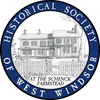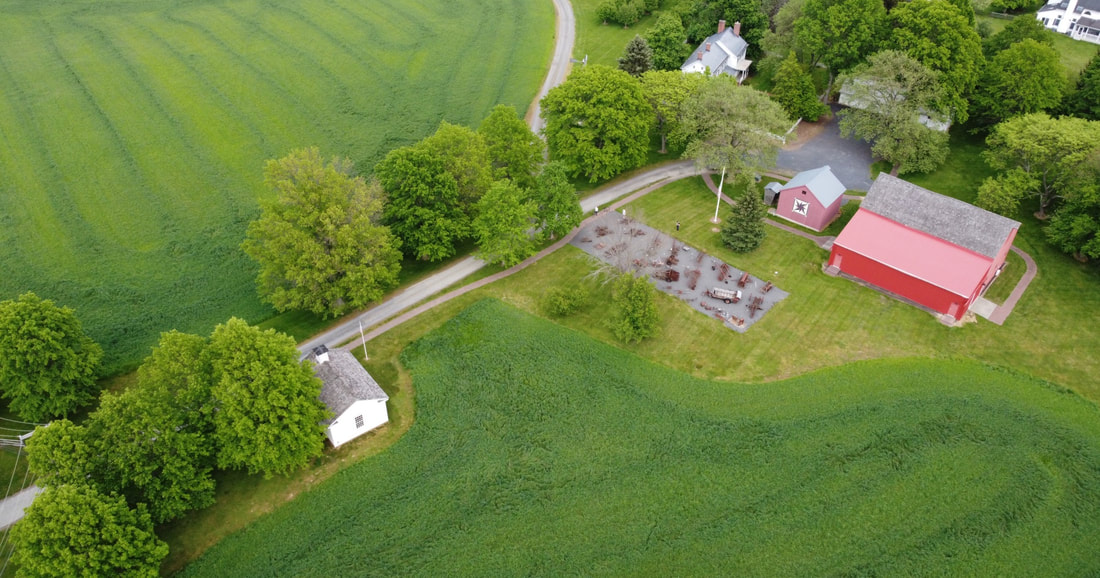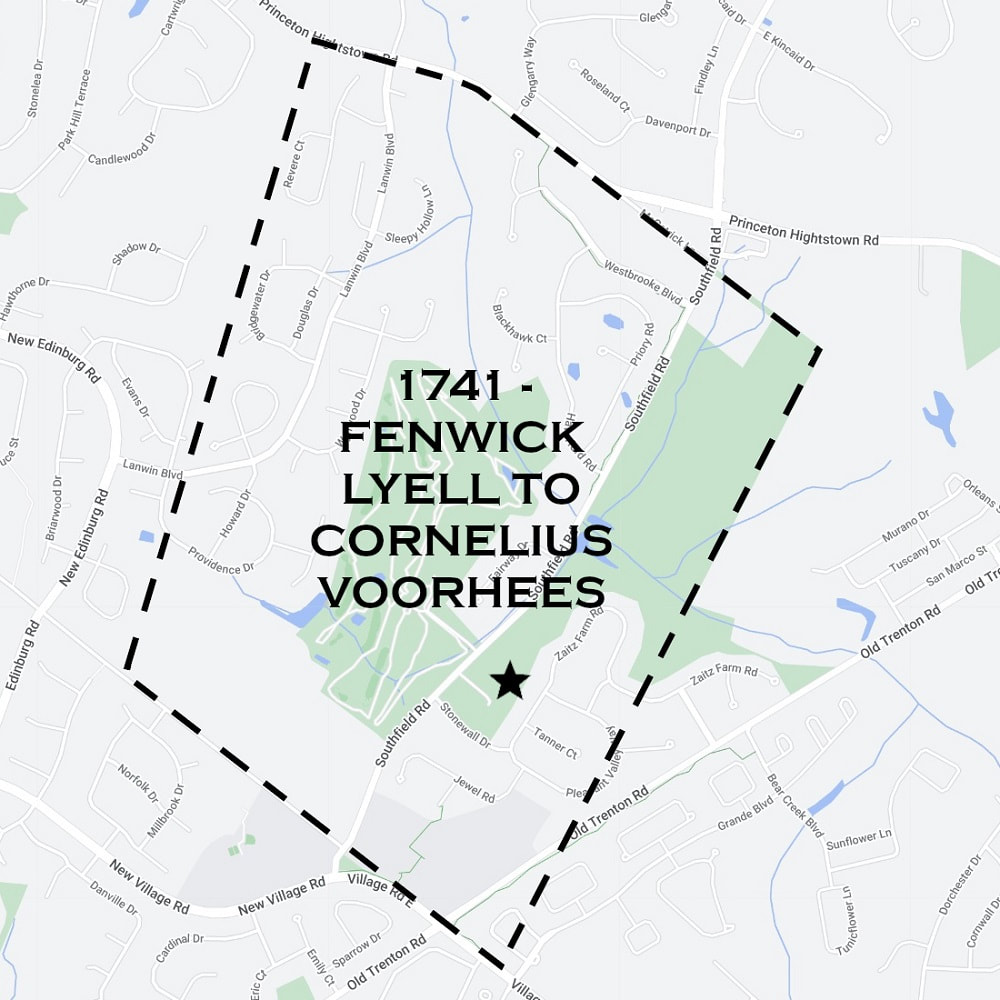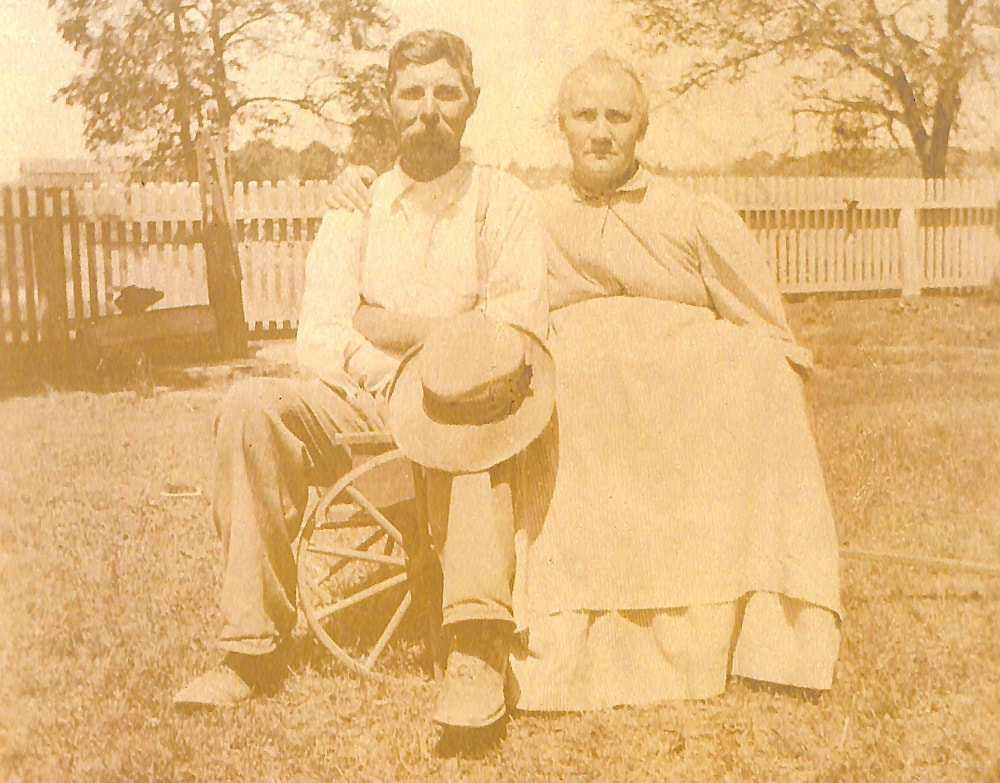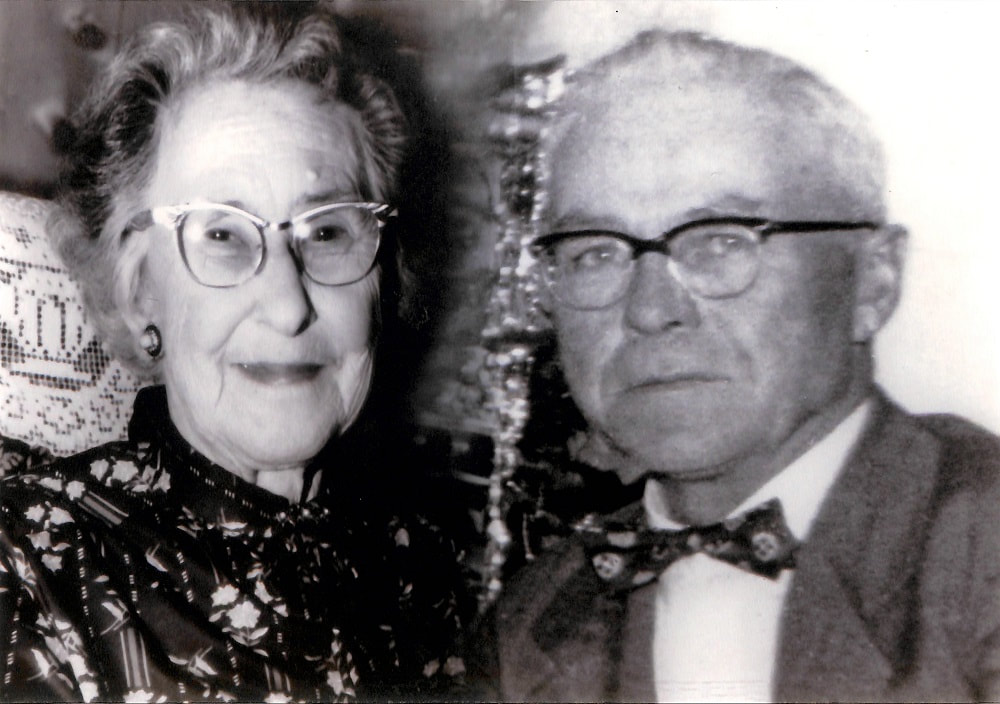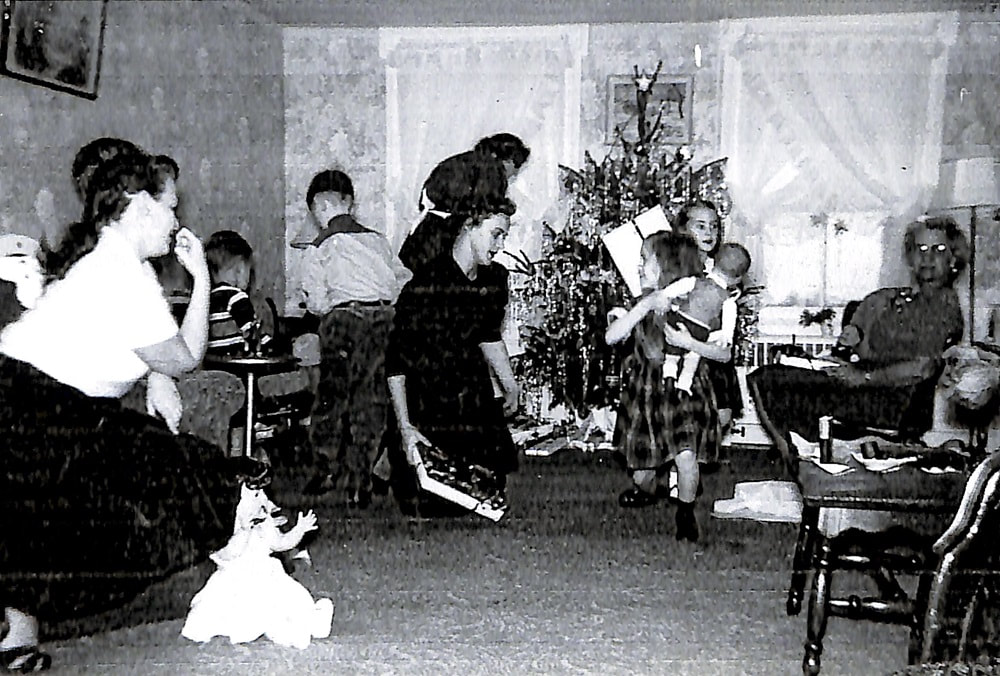Museum Tour: Property History
Historical Overview
|
The historic Schenck Farmstead/West Windsor History Museum is one of central New Jersey's oldest continuously-farmed parcels of land. The very first known individual landowner here was Governor of East New Jersey, Andrew Hamilton, who acquired about 5,000 acres of land in eastern West Windsor in 1694.[1] Three years later, a British goldsmith named David Lyell (of "Penn-Lyle Road") purchased this massive estate.[2]
However, it was likely not until the mid-1700s that the Schenck Farmstead was established. In 1741, Cornelius Voorhees purchased over 900 hundred acres from Fenwick Lyell, son of David.[3] Cornelius may have rented this land for use as a farm a decade prior as well.[4] This was around the time of West Windsor's first wave of colonial settlement. Cornelius, his wife Sarah, and their children built and lived in a house on this property - presumably the Schenck Farmhouse or possibly a predecessor (research is ongoing).[5] At some point, the 900-acre property was split up amongst Cornelius' heirs. The homestead thereafter passed through the Voorhies family until probably the 1780s or 1790s, when Samuel Fisher is thought to have acquired it from the heirs of William Voorhies.[6] Samuel's wife is suspected to have been Elizabeth Voorhies - possibly William's daughter. |
|
Samuel died circa 1803, and in 1818 his heirs the bulk of the property was sold to his son, John S. Fisher.[7] John may have owned the minority part of the property as early as 1803, however. John was a West Windsor Township Commissioner of Appeal in Case of Taxation from 1823-1825.[8] He is listed as having owned slaves in the 1830, 1840, and 1860 federal censuses[9],[10],[11] but it's unknown if they worked this farm or an adjacent one. One of the last two known slaves in West Windsor, named Diana Updike, is listed in 1860.[12] She may have been one of the last twenty slaves in the state.[13] Diana may have been related to Pompey Updike - a laborer for the Fishers and one of the best-documented free Black residents in West Windsor, who was once buried under where the Dutch Neck school's eastern parking lot exists today.[14],[15]
In 1850, John S. Fisher deeded the property - then around two hundred and fifteen acres of farmland - to his son Samuel and Samuel's wife Catherine in 1850.[16] One hundred and fifty acres were then sold to George and Elizabeth Young in 1863,[17] to James H. Everett in 1865,[18] and to Thomas S. Everett later in 1868.[19] Finally, in 1899, John and Anna Schenck, who had rented the farm since 1888, purchased the then-104 acre property, including its farmhouse, barns and outbuildings.[20],[21] From then on, it became known as the "Schenck Farmstead" and was where John and Anna raised their children, Annie, Lewis, Bessie, and Walter.[22] |
|
23 years later, in 1922, John and Anna's son, Walter, and his wife Mabel purchased the farm.[23] A map of how the farm was laid out in 1920 can be found here. Crops grown on the farm included hay, wheat, rye, potatoes, tomatoes, corn, and beans. There was a large kitchen garden behind the house which supplemented meals with additional fruits and vegetables. Cattle, pigs, chickens, and cows were also raised here and were used for a variety of purposes ranging from meat to manure to household products such as down pillows and leather.[24]
Walter and Mabel had two sons - Wilton and Warren.[25] In 1963, four years after Walter's death,[26] Wilton purchased the farm from his mother[27] and in 1971 sold it to the Zaitz Family, whose patriarch was Max Zaitz, a successful farmer who owned hundreds of land in the area.[28] Zaitz, in turn, rented the property to various tenants. In 1991, the Zaitz family deeded the farmhouse and 2 acres of property to the township for its dual use as museum and operational farm. In 1993, they donated an additional 119 acres.[29] |
|
Over the years, its previously dilapidated farmhouse, barn, and outbuildings have been meticulously rebuilt, to preserve the heritage of this property and West Windsor history. The property officially opened as a museum in 2002.[30]
Today, visitors to the Schenck Farmstead can explore several historic buildings, discover thousands of artifacts, and immerse themselves in West Windsor history. Inside the barn, carriage house, farm house, and schoolhouse are thousands of artifacts, some centuries old and emblematic of the agrarian lifestyle that dominated West Windsor in centuries past. In addition are multiple exhibits exploring the history of the farmstead, the history of West Windsor and the surrounding region, and environmental/historical preservation. Come visit us, meet our volunteers, and explore our town's rich heritage during one of our many events this year! |
Bibliography
- Hamilton, Andrew, Andrew Browne, David Mundre, James Dundey, L Morris, John Jiniane, Thomas Warne, et al. Ms. Indenture. New Jersey State Archives, 1694.
Conveyance of about 4,700 acres (as written in the deed) from the Proprietors of East Jersey to Andrew Hamilton. Found in the New Jersey State Archives - E (EJ): Folio 366 (SSTSE023) - Hamilton, Andrew, George Clarke, and David Lyell. Indenture. New Jersey State Archives, 1697. Conveyance of 4,700 acres (as written in the deed) from Andrew Hamilton via Executor George Clarke to David Lyell. Found in New Jersey State Archives Early Land Records - F (EJ): Folio 717 (SSTSE023)
- Lyell, Fenwick, and Cornelius Voorhees. Ms. Deed. New Jersey State Archives, 1741. Found in New Jersey State Archives Manuscript Room - Middlesex County Deeds.
- “David Lyell’s ‘Great Tract,” 1731.” n.d. Map. New Jersey Historical Society. Located at the New Jersey Historical Society’s headquarters in Newark, NJ. Created in 1731 to survey David Lyell’s “Great Tract” in present-day West Windsor in order to split it into 7 components for his heirs. Division lines as drawn and measured appear to align with several of West Windsor’s colonial-era roads.
- Lyell, Fenwick, and Cornelius Voorhees. Ms. Indenture. New Jersey State Archives, 1782. Found in New Jersey State Archives Manuscript Room - Middlesex County Deeds Book 1, page unknown (number ripped off; this is the page following Page 7).
- Covenhoven, Ann, Covenhoven, Jonathan P., Fisher, Jonathan S., Fisher, Hannah, Fisher, Susan, Fisher, William, Hunt, Gitty, Hunt, Peter W. “Indenture.” West Windsor, 1803. Located in the New Jersey State Archives, Middlesex County Deed Book 13 Page 88.
- Ibid.
- “West Windsor Township Meeting Minutes, 1797-2012.,” n.d. Original Township Committee meeting minute database located in the Municipal Center.
- United States Census, 1830 - West Windsor Township.” West Windsor Township, 1830.
- United States Census, 1840 - West Windsor Township.” West Windsor Township, 1840.
- United States Census, 1860 - West Windsor Township.” West Windsor Township, 1860.
- Ibid.
- J., Gigantino James II. The Ragged Road to Abolition Slavery and Freedom in New Jersey, 1775-1865. Philadelphia: University of Pennsylvania Press, Inc, 2014.
- Fisher, John S, and James H Scudder. “Will of John S. Fisher,” May 8, 1863. Mercer County Wills, 1838-1913 - Volume D, Page 65-67. Found on Familysearch.org.
- "Dutch Neck.” Essay. In Old Princeton’s Neighbors. Princeton, NJ: Graphic Arts Press, 1939. Written by the Works Progress Administration’s Federal Writers’ Project.
- Fisher, Catherine, Fisher, Jonathan S., Fisher, Catherine. “Indenture.” West Windsor, 1850. Located in the Mercer County Clerk's Office, Mercer County Deed Book V Page 570.
- Fisher, Catherine, Fisher, Catherine, Young, Elizabeth, Young, George. “Indenture.” West Windsor, 1863. Located in the Mercer County Clerk's Office, Mercer County Deed Book 57 Page 296.
- Everett, James H., Young, Elizabeth, Young, George. “Indenture.” West Windsor, 1865. Located in the Mercer County Clerk's Office, Mercer County Deed Book 61 Page 249.
- Everett, Caroline, Everett, James H., Everett, Thomas S. “Indenture.” West Windsor, 1865. Located in the Mercer County Clerk's Office, Mercer County Deed Book 70 Page 443.
- Everett, Caroline, Everett, Thomas S., Schenck, Jonathan H. “Indenture.” West Windsor, 1899. Located in the Mercer County Clerk's Office, Mercer County Deed Book 230 Page 171.
- "Broadside,” Spring 2002. Newsletter about the history of the Schenck Farmstead, produced by the Historical Society of West Windsor.
- United States Census, 1900 - West Windsor Township.” West Windsor Township, 1900.
- Schenck, Jonathan H., Schenck, Mabel T., Schenck, Walter L. “Indenture.” West Windsor, 1922. Located in the Mercer County Clerk's Office, Mercer County Deed Book 486 Page 497.
- "Broadside,” Spring 2002. Newsletter about the history of the Schenck Farmstead, produced by the Historical Society of West Windsor.
- United States Census, 1940 - West Windsor Township.” West Windsor Township, 1940.
- "Walter L. Schenck.” Trenton Evening Times, July 24, 1959.
- Schenck, Mae A., Schenck, Mabel T., Schenck, Wilton J. “Deed.” West Windsor, 1963. Located in the Mercer County Clerk's Office, Mercer County Deed Book 1668 Page 195.
- Schenck, Wilton J., Zaitz, Max. “Deed.” West Windsor, 1971. Located in the Mercer County Clerk's Office, Mercer County Deed Book 1871 Page 574.
- "Broadside,” Spring 2002. Newsletter about the history of the Schenck Farmstead, produced by the Historical Society of West Windsor.
- Ibid.
